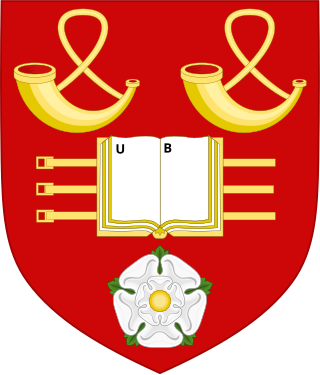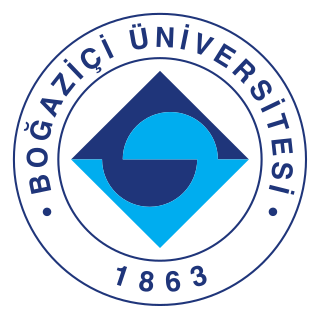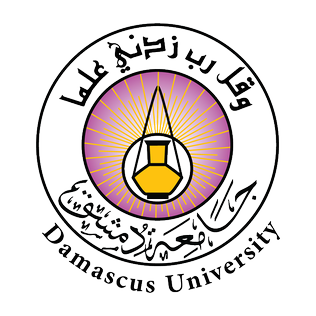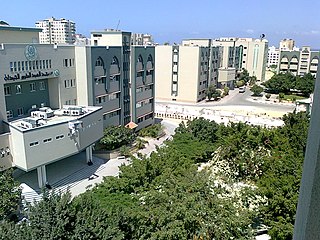
Allah is the common Arabic word for God. In the English language, the word generally refers to God in Islam. The word is thought to be derived by contraction from al-ilāh, which means "the god", and is linguistically related to the Aramaic words Elah and Syriac ܐܲܠܵܗܵܐ (ʼAlāhā) and the Hebrew word El (Elohim) for God.

The Quran, also romanized Qur'an or Koran, is the central religious text of Islam, believed by Muslims to be a revelation from God. It is organized in 114 chapters, which consist of verses. In addition to its religious significance, it is widely regarded as the finest work in Arabic literature, and has significantly influenced the Arabic language.
Corpus linguistics is the study of a language as that language is expressed in its text corpus, its body of "real world" text. Corpus linguistics proposes that a reliable analysis of a language is more feasible with corpora collected in the field—the natural context ("realia") of that language—with minimal experimental interference.

The University of Bradford is a public research university located in the city of Bradford, West Yorkshire, England. A plate glass university, it received its royal charter in 1966, making it the 40th university to be created in Britain, but can trace its origins back to the establishment of the industrial West Yorkshire town's Mechanics Institute in 1832.

Boğaziçi University, also known as Bosphorus University, is a major research university in Istanbul, Turkey. Its main campus is located on the European side of the Bosphorus strait. It has six faculties and two schools offering undergraduate degrees, and six institutes offering graduate degrees. Traditionally, the language of instruction is English.

The University of Damascus is the largest and oldest university in Syria, located in the capital Damascus and has campuses in other Syrian cities. It was founded in 1923 through the merger of the School of Medicine and the Institute of Law. Until 1958, it was named the Syrian University, but the name changed after the founding of the University of Aleppo.

The International Islamic University, Islamabad, or IIUI, is a public research university located in Islamabad, Pakistan. It was established in 1980 and restructured in 1985, and remains a valuable source for Higher Education in Pakistan. The university is regularly listed among the most recognized universities and prestigious degree awarding institutions of Pakistan by the Higher Education Commission of Pakistan. The university ranks joint second in the 2022 top university rankings of Times Higher Education World University Rankings in Pakistan. It also constantly ranks among the best universities in the country for the general category by Higher Education Commission of Pakistan.

The Islamic University of Gaza, also known as IUG andIU Gaza, is an independent Palestinian university established in 1978 in Gaza City. It was the first higher education institution to be established in Gaza Strip. The university has eleven faculties capable of awarding BA, BSc, MA, MSc, MD, PhD, diplomas and higher diplomas, in addition to twenty research centers and institutes and the affiliated Turkish-Palestinian Friendship Hospital.
Christopher Arthur Lattner is an American computer scientist, former Google and Tesla employee and co-founder of LLVM, Clang compiler, MLIR compiler infrastructure and the Swift programming language. As of 2022, he is the co-founder and CEO of Modular Inc, an artificial intelligence platform for developers. Before founding Modular AI, he worked as the President of Platform Engineering, SiFive after two years at Google Brain. Prior to that, he briefly served as Vice President of Autopilot Software at Tesla, Inc. and worked at Apple Inc. as Senior Director of the Developer Tools department, leading the Xcode, Instruments, and compiler teams.
Ashwin Ram is an Indian-American computer scientist. He was chief innovation officer at PARC from 2011 to 2016, and published books and scientific articles and helped start at least two companies.

Mohammad Al-Habash or Mohamed Habash is a Syrian Islamic scholar, and writer. He is the principal figure of the Islamic revivalist movement in Syria, and the founder of the Studies Center for Civilization and Enlightenment Research.
Informatics is the study of computational systems. According to the ACM Europe Council and Informatics Europe, informatics is synonymous with computer science and computing as a profession, in which the central notion is transformation of information. In other countries, the term "informatics" is used with a different meaning in the context of library science, in which case it is synonymous with data storage and retrieval.

The Quranic Arabic Corpus is an annotated linguistic resource consisting of 77,430 words of Quranic Arabic. The project aims to provide morphological and syntactic annotations for researchers wanting to study the language of the Quran.

The World Islamic Science & Education University is an Islamic university in Amman, Jordan that was established in 2008. It is accredited by the Jordanian Ministry of Higher Education and Scientific Research.

Fei-Fei Li is an American computer scientist who was born in China and is known for establishing ImageNet, the dataset that enabled rapid advances in computer vision in the 2010s.

The Birmingham Quran manuscript is a single sheet of parchment on which two leaves of an early Quranic manuscript or muṣḥaf have been written. In 2015 the manuscript, which is held by the University of Birmingham, was radiocarbon dated to between 568 and 645 CE. It is part of the Mingana Collection of Middle Eastern manuscripts, held by the university's Cadbury Research Library.
Cloud-based quantum computing is the invocation of quantum emulators, simulators or processors through the cloud. Increasingly, cloud services are being looked on as the method for providing access to quantum processing. Quantum computers achieve their massive computing power by initiating quantum physics into processing power and when users are allowed access to these quantum-powered computers through the internet it is known as quantum computing within the cloud.
The TenTen Corpus Family (also called TenTen corpora) is a set of comparable web text corpora, i.e. collections of texts that have been crawled from the World Wide Web and processed to match the same standards. These corpora are made available through the Sketch Engine corpus manager. There are TenTen corpora for more than 35 languages. Their target size is 10 billion (1010) words per language, which gave rise to the corpus family's name.
Mona Talat Diab is a computer science professor and director of Carnegie Mellon University's Language Technologies Institute. Previously, she was a professor at George Washington University and a research scientist with Facebook AI. Her research focuses on natural language processing, computational linguistics, cross lingual/multilingual processing, computational socio-pragmatics, Arabic language processing, and applied machine learning.












